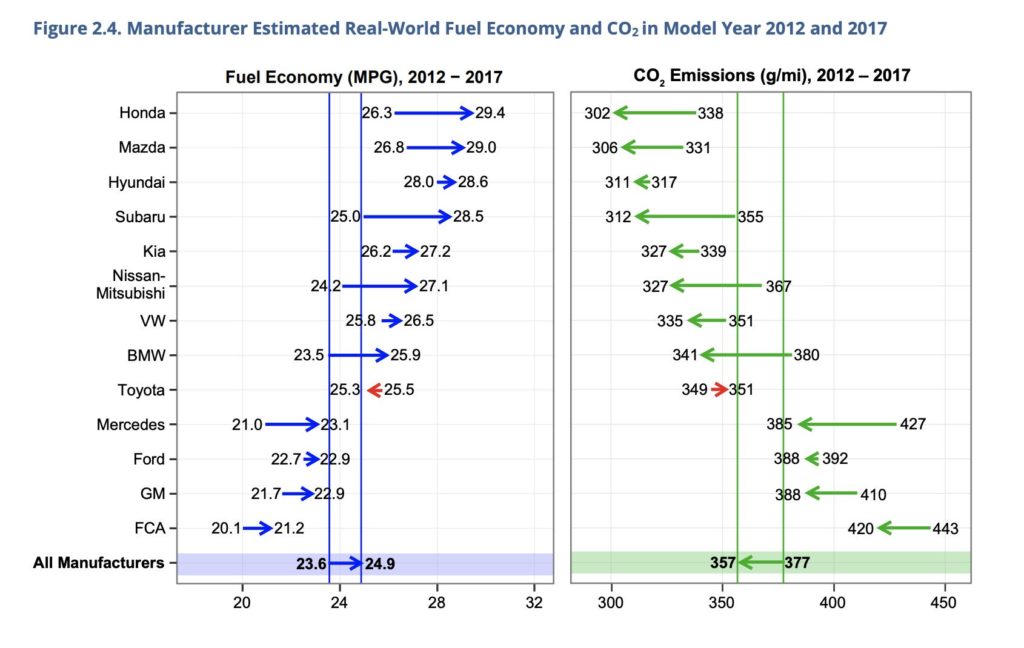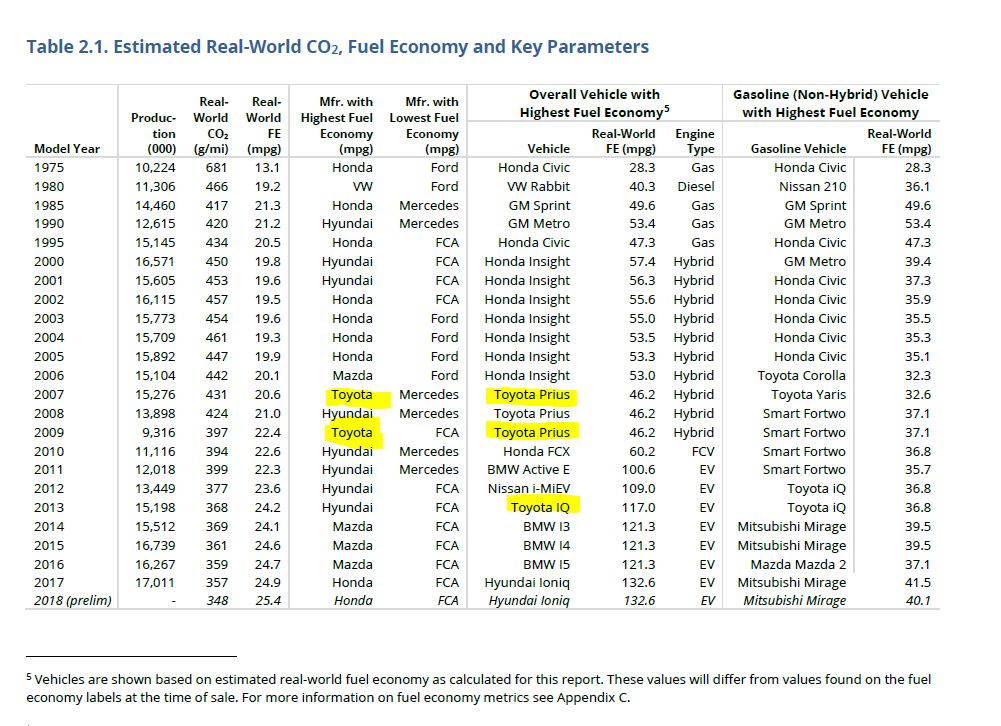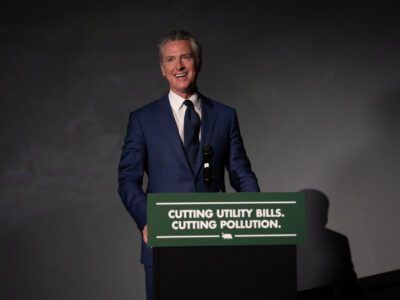Toyota’s Defense of Its Choice to Support the Trump Administration’s Auto Standards Rollback Rings Hollow
Sadly, Toyota Has Ceded Its Place As the Industry’s Environmental Leader
My colleagues Ann, Cara, Julia, and Rick have all written about various aspects of the decision by General Motors, Toyota, and other automobile manufacturers to side with the Trump administration as it tries to prevent California from setting its own greenhouse gas emission standards. The administration is implementing this rollback in tandem with a federal initiative to roll back GHG emission standards and fuel economy standards (from a fleet average of 54.5 mpg in model year 2025 to about 37 mpg in that same model year). California and other states have sued to block the rollback and maintain the unified federal and state standards agreed to in the Obama era. These automakers’ decision to intervene in the case has provoked a backlash from consumers and advocates concerned about the impacts of increasing emissions and reducing projected fleet average fuel economy by almost 20 miles per gallon. Toyota has responded with a remarkable PR statement defending its action as well as its place as an environmental leader among auto companies. Toyota’s statement shouldn’t be taken seriously; it has ceded its place as the industry’s environmental leader, and its defense is based on faulty premises and misleading rhetoric.
First, Toyota says:
Toyota is passionate about the environment and reducing our impact. Our drive for continuous improvement of society is built into our DNA, and as a leader in electrified vehicles, it’s who we are as a company. The 179,000 Americans who support their families working for Toyota and our dealerships feel the same way. Toyota supports year-over-year improvements in fuel economy that provide meaningful benefits to our climate, while better aligning with what consumers want. That’s why we remain committed to be an industry leader in the development of vehicles that help reduce greenhouse gases.
This isn’t an accurate portrayal of either Toyota’s commitment to reducing greenhouse gases from auto emissions, or its role in the electric vehicle market. In fact, Toyota is the only major automaker whose US GHG emissions and fuel economy have gotten worse since 2012. This chart, from a EPA’s most recent automotive industry trends report (highlighted in a tweet thread by Hiroko Tabuchi from the New York Times) shows that Toyota has not in fact made the claimed “year-over-year improvements” in recent years.

Two dynamics have caused this: First, Toyota was an industry leader in hybrid technology and sales in the mid-to-late 2000s, but has lagged in developing and deploying fully-electric vehicle technology—the crucial step in getting the most efficient cars from about 50 mpg to over 100 mpg-equivalent, and in creating the technological leap we need to electrify our vehicle systems. And second, Toyota has been relying heavily on sales of SUVs and trucks in its overall fleet sales strategy. Thus, its claim to be an industry leader in vehicle electrification and in GHG reduction was true a decade ago, but isn’t true today. And based on this trend, it may be clearer why Toyota isn’t eager to honor its commitment to a 54.5 mpg fleet average, and corresponding reductions in greenhouse gas emissions, by 2025.

Toyota goes on to explain its position on a single national fuel economy standard, and how that position motivated it to participate in the lawsuit:
Toyota entered into this legal action not as a plaintiff or a defendant, and not to favor any political party. Toyota is intervening to impact how emissions standards are applied. We want to help forge a sustainable compromise for consumers and the environment. Without joining this legal action, we would have no ability to affect the outcome.
We do not believe that there should be different fuel economy standards in different states. There should be one standard for all Americans and all auto companies. That is why we decided to be part of this legal matter. Doing so does not diminish our commitment to the environment, nor does it lower our desire to manufacture vehicles that produce fewer emissions year-after-year.
Here, too, Toyota’s comments are misleading. First, as Julia has noted, California isn’t claiming the right to set its own fuel economy standards. Those are still federal. Rather, California has the right to set its own emission standards under the Clean Air Act–even if those standards also happen to increase fuel economy. And second (also noted by many others), there can be at most two emission standards, not multiple standards: California’s, which can be adopted by other states under Clean Air Act section 177, and a federal standard. Moreover, it is the Trump administration’s action to roll back federal standards—not anything California has done—that have resulted in the potential for two standards rather than one. We had a single national standard until the Trump administration decided otherwise. (Note also that none of the standards prevent any manufacturer from selling any particular vehicle anywhere, since they are overall fleet requirements.)
And most importantly, despite its protestation that it’s not taking sides, Toyota explicitly seeks to join the legal action to support the Trump Administration—the defendant in the case. It’s ridiculous to argue otherwise by saying the company “entered into this legal action not as a plaintiff or a defendant.” The intervention motion specifically says that
Petitioner is seeking a determination that, as a matter of law, fuel economy regulations set by the national government under EPCA lack preemptive force. Such an outcome would directly impair the Movants’ substantial interests in maintaining strong and achievable fuel economy standards that apply nationwide without any prospect of state-level interference…
And also that their intervention “will ensure representation of the interests of those members of the automobile manufacturing industry who would be adversely affected by adjudication in favor of Petitioner [California].” [Emphasis added.] It’s 100% clear whose side Toyota is taking in the litigation: it is favoring the Trump administration’s proposal to drastically lower emissions standards and fuel economy standards throughout the country.
Finally, Toyota says this:
Multiple standards will result in higher vehicle prices. And if vehicle prices increase, consumers are more likely to keep older, less efficient cars longer. We can do more to reduce greenhouse gases by focusing on the 250 million vehicles already on the road today. We need to encourage consumers to trade in older, less efficient vehicles for newer vehicles that have higher fuel economy and therefore emit fewer greenhouse gases. We won’t be able to do that if prices are beyond what people are willing to or can afford.
Robinson Meyer, in an excellent, in-depth 2018 analysis of these rollbacks in the Atlantic, considered and addressed this argument. His research and reporting found that consumer advocates who follow the industry flat-out disagree with it. Meyer wrote:
The government would best bring down emissions, [automakers] say, by getting Americans to trade their old, inefficient vehicles for new ones.
Consumer-advocacy groups loathe these arguments, as they calculate that Americans save more money with the rules than without them. In a recent report, the Consumer Federation of America found that nearly half of “all-new 2017 models” cost less to buy and fuel than their 2011 counterparts did.
“The retail cost of cars doesn’t go down; it always goes up,” said Jack Gillis, an author of that report and a researcher for the federation. “But one of the most remarkable aspects of [fuel economy standards] is that the fuel savings that result from the standard more than pay for the annual increases to cost of the vehicle.”
“The fuel savings also cover—and this is what’s more important to me—the cost of new safety features, like automatic crash protection, automatic braking, and automatic lane changing,” said Gillis, who has also written every edition of The Car Book since 1980.
NYU’s Institute for Policy Integrity filed in-depth comments on the flaws in the Trump administration’s economic analysis of the rule. And Consumer Reports concluded in a recent report that the federal rollback will cost consumers billions of dollars. The proposed rollback of federal standards simply will be worse for car owners, public health, safety, and the environment.
Toyota and the other automakers along for the ride with the Trump administration are correct about one thing: there may be real advantages to having a single national standard rather than two standards. But these advantages work to the advantage of all of us only if that standard is stringent enough to create industry-wide change, as it has been in the past.
If Toyota and other manufacturers are serious about their commitment to fuel economy, greenhouse gas emissions reduction, affordable vehicles, and national standards, they should advocate strongly for a single, national standard like the one negotiated and set into law in the Obama administration—one that has fallen apart only because of the Trump administration’s single-minded focus on destroying it. Toyota’s, and other companies’, advocacy in this case reveals only their lack of any real commitment to those goals.
Reader Comments
2 Replies to “Toyota’s Defense of Its Choice to Support the Trump Administration’s Auto Standards Rollback Rings Hollow”
Comments are closed.







As an environmentalist, Im disgusted that the company that’s led with models like the Prius would sell out like this. We face a climate crisis. California’s burning. And Toyota is helping to fight AGAINST stronger auto emissions standards?
California should simply enforce its lawful standards against Toyota, GM and others. They will suffer the consequences when Trump’s unlawful attempt to revoke California’s waiver under the Clean Air Act fails.